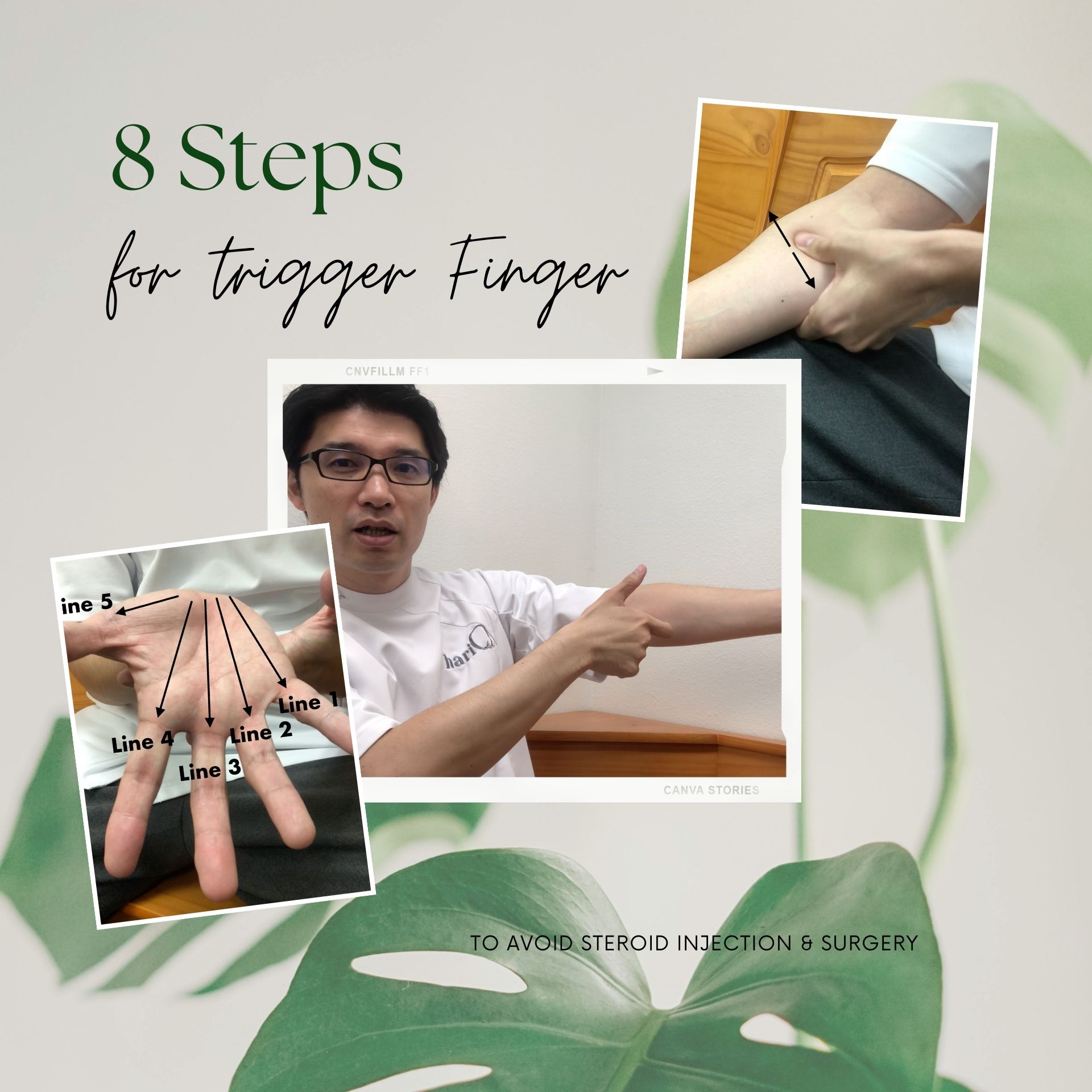Treat Your Migraine: 10 Acupressure Points By Yourself
I'd like to show you how you can use acupressure—a powerful technique from Traditional Oriental Medicine—to find relief from your migraine symptoms.

January 17, 2026
Massaging and stretching are essential tools for Trigger Fingers because they increase blood flow, soften tissue, and loosen muscle and tendons by increasing the human’s healing ability.
In this blog, I’ll share how to massage & stretch that you can do at home for Trigger fingers.
We understand this can be a lot of information and overwhelming. If you are looking for more support and answers, set up a free consultation with our Trigger Finger Specialist, Satoru Ozawa. Share your story, get your questions answered, and learn how you can set yourself up for tremendous success in achieving a healthy life.

Trigger Finger is a medical condition also called stenosing tenosynovitis. This happens when the affected finger’s flexor tendon and/or tendon sheath becomes inflamed, making it difficult to straighten or locks up in a bent position. While it’s more common in women than men, it can happen to anyone. Most commonly happen to people who use their hands for repetitive gripping, typing, or playing an instrument like the guitar or piano. This condition is also common for people who have medical conditions like diabetes, gout, etc.
Prior to showing you how to massage for trigger finger, it’s important for you to have some understanding of the anatomy of the hand.
There are three major muscles involved in gripping, making a fist, typing, holding something, knitting, and other activities. These are called
Extrinsic Muscles

Intrinsic Muscles

Your index, middle, ring, and pinky fingers are moved by the flexor digitorum superficial and profundus muscles, while your thumb is controlled by the flexor policis longus muscle. These muscles run through your wrist and fingers, enabling you to carry out your daily activities.
Other intrinsic muscles are connected inside your hands, from the 3rd metacarpal bone in the middle of your palm to your thumb.

A tendon sheath is a protective covering surrounding tendons like a wrap as they pass through joints. It helps to reduce friction and allows for smooth movement of the tendon.

Before you start massaging, it’s important to stretch to improve the flexibility of your tendons.
Let’s start with forearm and palm stretches, which have two parts. For the first part, extend your arm in front of you with your palm facing up and keep your elbow straight. Place your left hand on top of your right hand as if you’re shaking hands, and gently pull your hand towards you until you feel a stretch in your forearm. Hold this position for 30 seconds before releasing slowly. So with this, you can do 3-5 sets.

The following exercise is similar to the first one. Still, instead of straightening your elbow, you should bend it and hold your fingers instead of your palm. Push down, and you will feel the stretch on your palm instead of your forearm. Hold for 30 seconds and then slowly release. You can repeat this exercise for 3-5 sets.

This exercise targets the Flexor policis longus and other intrinsic muscles in your hand to improve flexibility. To perform this exercise, place your right hand in front of you with your palm facing down. Then, grab your thumb and pull it slowly towards you until you feel a stretch. Hold this position for 30 seconds.

Now, you’re going to pinch your skin. Most of the people who get trigger fingers have either tight muscles or so is their skin. When you pinch the skin, visualize you’re pulling the skin out of the muscle. We will start from the elbow crease, pinch the skin, hold for a few seconds, and release. Then, you can move down to the next part. You can continue to do this pinching until the wrist crease. You can repeat 3 more times.

During this massage, you apply pressure to the muscle tissue in a crosswise direction, which helps to stimulate both the muscle and the fascia (the skin surrounding the muscle). This can result in the softening of the tissue.
Now, I want you to imagine there are 3 lines on your forearm. To locate the three lines on your forearm, start from the elbow crease and move toward the wrist crease. The line closest to the center is line 1, followed by line 2 in the middle and line 3 on the outside. Then, depending on the length of your forearm, you can divide them into approximately 5 to 6 sections. Place your thumb on the line to massage these lines and rub them vertically 5-10 times before moving on to the next one. Make sure to apply enough pressure, but not too much, to avoid pain. If you experience discomfort, you may be pressing too hard.


The next one is massaging on your palm. Like your forearm massage, you make 5 lines from the wrist crease to the base of the fingers. Rub horizontally 5-10 times and move on to the next section. Be careful when you rub at the base of the finger. Most of the time, when you have trigger fingers, it depends on which finger you have; the base of the affected fingers is very sensitive. So, if you feel the massage is too painful, you can skip the area. You can do it 3-5 sets.


In order to improve the flexibility of your fingers, it is important to massage your knuckles. To do this, turn your hand palm down and massage the up-down movement between each knuckle using your thumb. Repeat this for 10 seconds on each knuckle and do 3-5 sets.

Once you’ve completed your stretching and massage routine, I recommend using heat therapy to further enhance blood flow. A portable hand warmer is a convenient option for on-the-go use, but you can also use a heat pack and apply it to the affected area for 20 minutes.
I really like using this little hand warmer because it can keep my hands warm for up to 10 hours and I can use it whenever I need to. Plus, it’s so small that I can just keep it in my pocket when I’m not using it. It’s really handy!
I suggest using a neck wrap to help ease any tension in your neck. Sometimes, tightness in the neck can slow down progress when treating trigger finger. It can make it harder for proper blood flow to reach your fingers. To help speed up the healing process, I recommend using a heat pack for about 20 minutes each day.
Performing this exercise on a regular basis can help speed up your healing process and avoid the need for steroid shots or surgery. If you’re still having trouble straightening your finger, you might want to consider alternative treatments, like acupuncture, before deciding on surgery to cut your finger.
We'll be happy to answer your questions.
Yes. Acupuncture is very effective for trigger fingeres. We examined your affected finger and muscle tightness during the initial acupuncture session. You may be unable to straighten up or get stuck in a bent position due to pain. The treatments focused on reducing inflammation and swelling and restoring movement in fingers. Acupuncture has been shown to be incredibly practical in reducing pain and inflammation due to its ability to stimulate the body to release its natural painkillers. So, you start feeling relieved from the pain after each session.
Treating trigger finger early improves chances of positive outcome. Delayed treatment may lead to chronic and complicated cases with no guarantee of complete recovery.
The frequency of acupuncture treatments depends on the type of condition. Recent conditions need more frequent visits, while chronic ones may require less. For example, 2-3 treatments per week may be needed for new trigger finger pain, but chronic cases may only need weekly visits.
If you or a loved one was diagnosed with trigger fingers and want to learn more about Acupuncture and whether it’s appropriate for your case, send us a message through our contact page. Thank you for taking the time to read this blog post! I appreciate your interest and hope to see you again for future posts.
We understand this can be a lot of information and overwhelming: if you are looking for more support and answers, set up a free consultation with our Trigger Finger Specialist, Satoru Ozawa. Share your story, get your questions answered, and learn how you can set yourself up for tremendous success in achieving a healthy life.
The following blogs discuss natural remedies, acupuncture, Chinese medicine, Chinese herbs, and tips for maintaining good health.
I'd like to show you how you can use acupressure—a powerful technique from Traditional Oriental Medicine—to find relief from your migraine symptoms.
Living in Plano, you know the weather changes. Sudden storms and fronts cause barometric pressure migraines. Get help for the headaches and throbbing pain.
As a practitioner, my focus is on giving you the best tips for your health. But today, I want to share one that is at the heart...

Satoru Ozawa, L.Ac, ATC
hariQ acupuncture & herbs
Licensed acupuncturist, Certified Athletic Trainer and Chinese herbal specialist. With his 10 years of experience in Oriental Medicine, he will recommend the best natural Remedies, including Acupuncture, Chinese herbs, and health tips to relieve your suffering.